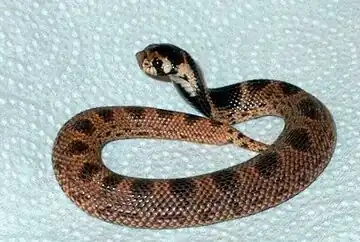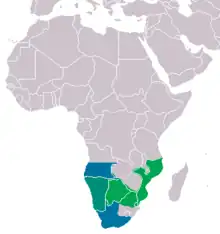| Aspidelaps | |
|---|---|
 | |
| A. scutatus, the shield-nosed cobra | |
| Scientific classification | |
| Domain: | Eukaryota |
| Kingdom: | Animalia |
| Phylum: | Chordata |
| Class: | Reptilia |
| Order: | Squamata |
| Suborder: | Serpentes |
| Family: | Elapidae |
| Genus: | Aspidelaps Fitzinger, 1843 |
 | |
Aspidelaps is a genus of venomous elapid snakes endemic to Africa. Species in the genus Aspidelaps are commonly called shield-nosed cobras, African coral snakes or coral cobras after their cobra hoods and enlarged rostral (nose) scales. However, the hood is not nearly as well developed in Aspidelaps as it is in the true cobras of the genus Naja.
Species
| Image | Species | Authority | Subsp.* | Common name | Geographic range |
|---|---|---|---|---|---|
 |
A. lubricus | (Laurenti, 1768) | 2 | Cape coral snake | South Africa (Cape Province), southern Angola, Namibia |
 |
A. scutatus | (A. Smith, 1849) | 3 | shield-nosed cobra | Namibia, Botswana, Zimbabwe, north-east South Africa, Mozambique |
Venom
Aspidelaps venom is neurotoxic, and Aspidelaps bites have caused human deaths in a few cases.[1]
References
- ↑ Branch, Bill (2004). Field Guide to Snakes and other Reptiles of Southern Africa. Third Revised edition, Second impression. Sanibel Island, Florida: Ralph Curtis Books. 399 pp., 112 color plates. (Genus Aspidelaps, p. 103).
External links
- Genus Aspidelaps at The Reptile Database
Further reading
- Boulenger GA (1896). Catalogue of the Snakes in the British Museum (Natural History). Volume III., Containing the Colubridæ (Opisthoglyphae and Proteroglyphæ) ... London: Trustees of the British Museum (Natural History). (Taylor and Francis, printers). xiv + 727 pp. + Plates I-XXV. (Genus Aspidelaps, p. 390).
- Branch, Bill (2004). Field Guide to Snakes and other Reptiles of Southern Africa. Third Revised Edition, Second impression. Sanibel Island, Florida: Ralph Curtis Books. 399 pp. (Genus Aspidelaps, p. 103).
- Fitzinger L (1843). Systema Reptilium, Fasciculus Primus, Amblyglossae. Vienna: Braumüller & Seidel. 106 pp. + indices. (Aspidelaps, new genus, p. 28). (in Latin).
This article is issued from Wikipedia. The text is licensed under Creative Commons - Attribution - Sharealike. Additional terms may apply for the media files.